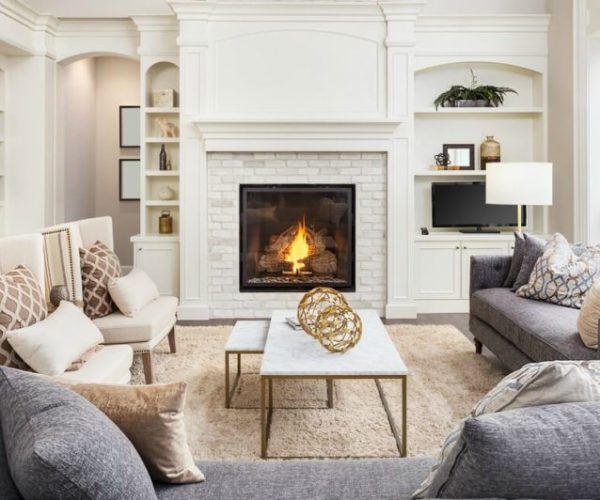6 Factors to Consider When Choosing
the Right Decorating Course
6 Factors to Consider When Choosing the Right Decorating Course
If you have a passion for decorating and interior design, an eye for detail, and a desire to help others enhance their living spaces, you might be considering a career as a decorator. The question, “How do I choose a decorating course?” is a critical step in this journey.
Selecting the right course is essential for developing the skills and knowledge necessary to succeed in this field. This guide provides clear and concise advice to help you navigate the options available. We will explore the process of identifying courses that align with your personal and professional aspirations, the importance of a well-rounded course curriculum, compare online and in-person learning experiences, and other essential factors.
By the end of this article, you will be equipped with the knowledge to make an informed decision in your pursuit of excellence in decorating.
1. Identify Your Personal and Career Goals
Selecting a decorating course is a significant decision that can shape your future career. To ensure you make the right choice, it’s essential to align the course with your personal and career goals. Here’s why this alignment is so important:
Defining Your Niche: The field of decorating is vast, encompassing everything from residential to commercial design. By understanding your career goals, you can select a course that specializes in your area of interest, whether it’s traditional home décor, modern commercial spaces, or something in between.
Skill Development: Different courses offer different skill sets. If your goal is to become a decorator who excels in innovative designs, seek courses that focus on creativity and trends.
Meeting Market Demands: Awareness of your career objectives helps you understand the market you will be operating in. This understanding allows you to select a course that teaches not only design principles but also provides insights into market trends, client management, and business strategies.
Personal Satisfaction: Decorating is a field driven by passion and creativity. Choosing a course that resonates with your personal interests and strengths will not only be more enjoyable but will also likely lead to greater success and fulfillment in your career.
Resource Allocation: Courses vary in terms of time, cost, and commitment. By understanding your long-term goals, you can invest your resources wisely, choosing a course that offers the best return on investment for your specific career path.
Adapting to Industry Changes: The decorating industry is dynamic, with trends and technologies constantly evolving. A course that aligns with your career goals will help you stay adaptable and forward-thinking, equipping you with the skills to evolve with the industry.
2. Evaluate Course Curriculum
When selecting a decorating course, a critical aspect to consider is the course curriculum and the topics it covers. Here’s how to evaluate these effectively:
Comprehensiveness: A good decorating course should cover a broad range of topics. Look for curriculums that offer a mix of fundamental design principles, colour theory, space planning, and material selection as well as business, sales and marketing. Courses at Ultimate Academy® exemplify this by providing a curriculum that delves into fundamental design principles and also crucially includes business, sales, and marketing aspects. This blend is essential as it equips you not just with design skills but also with the acumen to market your talents and establish a successful business in the decorating industry.
Practical Skills: The curriculum should emphasize practical skills. This includes experience with decorating practices, consultation reports, marketing messages and more. Courses that include activities with real-world relevance, skill application and critical thinking are advantageous to your growth as a learner and decorator.
Sustainability and Ethics: With a growing focus on sustainable practices, look for courses that teach environmentally responsible design, use of sustainable materials, and ethical sourcing. Courses like those at Ultimate Academy® discuss eco-friendly decorating practices, enabling students to integrate environmentally conscious decisions into their services.
With a growing focus on sustainable practices, look for courses that teach environmentally responsible design, use of sustainable materials, and ethical sourcing.
Business and Marketing Skills: If you’re planning to start your own decorating business, it’s crucial that the course covers business-related topics. This includes business management, marketing strategies, client relations, and branding.
Cultural and Historical Context: Understanding the historical and cultural aspects of design is essential. The curriculum should include a study of different styles and periods, and how they influence contemporary decorating.

3. Consider Student Reviews & Testimonials
When you’re looking for a decorating course, it’s a good idea to see what other students have said about their experience. Reading reviews can give you a sense of how good the course is and what you might learn. For example, you can find out if the course does a good job teaching important things like how to design a space, work with clients, and understand the business side of decorating.
Student stories also tell you about the practical stuff you need to know before signing up, like how much it costs, how long it takes, and what the teachers are like. Knowing all this helps you get a complete picture of the course and can help you decide if it’s the right one for you.
It’s also crucial to ask questions directly to the course providers to get specific information and clarify any doubts. Here are some questions you might want to ask:
- What are the main objectives of this decorating course?
- Can you describe the balance between theory and practical learning?
- How does the course stay up-to-date with the latest trends and technologies in decorating?
- What are the qualifications of the instructors?
- Can you provide examples of success stories from past students?
- What resources are available to students for ongoing support after the course ends?
- How does the course prepare students for the business aspects of running a decorating service?
- What are the class sizes, and how does that affect individual learning?
4. Career Support
Building a network and having access to career guidance are key factors in forging a successful path in the decorating industry. While achieving certification, a significant milestone, the relationships you form and the support you receive throughout your education can be just as impactful.
In your search for the right decorating course, give preference to those that offer career services and opportunities to connect with others. Look for courses which include mentorship, help with setting up your business name, and the development of marketing and branding strategies, as well as support in client relations. For instance, Ultimate Academy® provides comprehensive support to ensure you’re well-equipped for the business side of decorating.
Target courses that establish networking channels among their graduates, possibly through exclusive social media groups or online forums where former students can exchange ideas, collaborate, and offer support to one another. Other valuable networking formats might include live events or workshops, offering the chance to meet peers and seasoned industry professionals.
A course that combines career support with opportunities for networking will provide you with more than just decorating skills; it will also give you the business knowledge and industry connections that are key to a successful decorating career.
5. Online vs. In-Person Learning
Selecting the right decorating course often involves weighing the pros and cons of online versus in-person learning.
Online Decorating Courses: Flexibility and Accessibility
Online courses provide unmatched flexibility, making them a practical choice for individuals with other commitments, such as work or family. You can study at your own pace and access materials from anywhere, which is particularly useful for those who cannot easily travel to a classroom. Additionally, many online programs offer curriculums as thorough as those you would find in face-to-face settings, ensuring that the education you receive is robust and comprehensive.
In-Person Decorating Courses: Interactive Learning and Practical Experience
On the other hand, in-person courses enable direct interaction with instructors and fellow students. This interaction is invaluable for networking and establishing connections in the decorating industry. In-person settings also typically allow for live feedback, which can be crucial for mastering decorating techniques. However, some online courses, like those provided by Ultimate Academy®, strive to emulate the in-person experience with descriptive feedback, interactive discussions, and real-time instruction, offering the best of both worlds.
Additional Considerations
Time Management: If you need a flexible learning schedule, online courses might suit you best. In contrast, in-person courses tend to have a fixed schedule.
Travel: Factor in the costs and time of commuting to a campus for in-person courses.
Social Learning: Consider whether you thrive in the social setting of a classroom or prefer the focused environment of online learning.
Ultimately, the quality of the course content is more important than the format. Whether online or in-person, a decorating course should offer a detailed curriculum that encompasses all the crucial elements of the field, providing a well-rounded education that prepares you for a successful career in decorating.
6. Duration and Time Commitment
Choosing to pursue a career in decorating requires careful thought about how much time you can dedicate to learning. The length of courses offering a certificate in decorating can vary widely. Some might be intensive one-week courses, while others could stretch over several months or even years, depending on how comprehensive they are and your personal schedule.
But it’s not just about the hours you spend in class. You should also consider the time needed for homework, projects, studying for quizzes, and preparing for exams. That’s why picking a course format that fits your lifestyle is so important. For example, Ultimate Academy® offers a flexible learning format. They provide recordings of their live virtual classes and a self-paced home study option, so you can learn when it works best for you. This flexibility is especially helpful if you’re juggling other responsibilities like a job or family. The 5-day live virtual decorating course is perfect for those who want to get certified and begin their decorating and business ventures quickly.
When you’re choosing a course, keep in mind that the time and effort you put in now will lay the foundation for your future in decorating. The key is less about how long the course takes and more about how committed you are to learning and growing in the field. Consider also the availability of post-course support and resources, as ongoing learning and adaptation are crucial in the ever-evolving world of decorating. Your investment in education is not just for the immediate skills gained but for the long-term development of your career in this creative and dynamic field.

FAQs for Choosing a Decorating Course
To choose a decorating course, first, clarify your career goals to understand the specific skills and knowledge you require. Assess the curriculum of potential courses to ensure they cover essential topics like design principles, practical skills, and business management. Reading reviews from past students can provide valuable insights into the course’s effectiveness and relevance.
Additionally, consider the career support offered by the course, such as mentorship or business development guidance. Finally, evaluate whether online or in-person courses better suit your learning style and schedule.
The qualifications needed to be a decorator can vary. Some decorators start with a high school diploma and gain experience through apprenticeships, while others may pursue specialized training or certificates in decorating or related fields. A thorough understanding of design principles, color theory, and materials is essential.
Additionally, skills in client communication, project management, and business acumen are highly beneficial for a successful career in decorating—this is where training courses come into play.
Choosing a decorating style involves reflecting on your personal preferences and lifestyle needs. Consider what colors, textures, and furniture styles you are drawn to. Research various decorating styles, such as modern, traditional, or rustic, for inspiration. It’s also important to consider the architecture of your space and its functional requirements.
Experimenting with mood boards or design software can help visualize your ideas and bring your chosen style to life. You will learn all of this in a decorating course.
To start a career as a decorator, it’s important to acquire knowledge in design principles and decorating techniques by enrolling in training courses. Additionally, supplement this learning with self-study to deepen and enhance your understanding of the concepts taught in the courses. Building a portfolio that showcases your work, including personal or volunteer projects, is also beneficial.
Engaging with professionals in the industry through events, social media, or local business groups can lead to new opportunities. Starting by offering your services to friends or family is a great way to gain practical experience and earn referrals.
Obtaining a decorator certificate can be valuable as it provides formal training, credibility, and enhances your skills and knowledge. It can set you apart in a competitive market and may open more professional opportunities.
Having experience and some projects under your belt is also advantageous in this field. Both knowledge and skill enhancements from training and prior experience fuse together to create a confident and talented decorator.
The main difference between an interior designer and a decorator lies in their education and the scope of their work. Interior designers typically require formal education in interior design, which includes studying design principles, space planning, and architecture. They often work on more extensive remodeling projects and may need to be licensed in some regions.
Decorators, on the other hand, focus on aesthetics, such as colour schemes, furniture, and accessories. While they don’t technically need formal education or licensing, many clients prefer decorators with certification. Additionally, decorators should have a good eye for design and be knowledgeable about current trends and styles. Unlike designers, decorators typically don’t handle structural work or architectural changes.
Conclusion
Embarking on a career as a decorator, fueled by your passion for decorating and interior design and your eye for detail, is an exciting journey. Choosing the right professional decorating course is a pivotal decision that lays the foundation for your success in this field. Throughout this guide, we have navigated through the critical aspects of this decision-making process. From identifying your personal and career goals, evaluating the course curriculum, considering student reviews and testimonials, to understanding the importance of career support, and weighing the pros and cons of online versus in-person learning, each step is essential.
We’ve also discussed the significance of considering the duration and time commitment of various courses. This journey in decorating is not just about learning the technical aspects of design; it’s about aligning your education with your aspirations, embracing the journey of continuous learning, and preparing yourself for a dynamic career in enhancing living spaces. Remember, the right course should not only provide you with the necessary skills and knowledge but also ignite your passion and drive for creativity and innovation in decorating.
With the insights from this article, you are now better equipped to make an informed choice that aligns with your personal and professional aspirations in the world of decorating. The path ahead is vibrant and full of possibilities, and with the right preparation, you’re set to make a significant impact in the realm of interior design and decorating.









